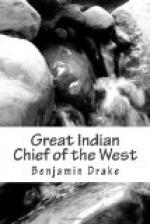Naopope further stated that the Pottowatomies immediately left them, and that none of the Kickapoos ever joined them. A few of the Winnebagoes did, and brought in scalps at different times; but so soon as they discovered that the whites were too powerful for the Sacks, they turned round and fought against them. Some of the other witnesses examined on this occasion, testify, that when Black Hawk saw the steam boat Warrior approaching them, on the first of August, he said he pitied the women and children; and, having determined to surrender to the commander of the boat, raised a white flag which was immediately fired upon. This fact is stated in the letter of the Captain of the Warrior, and is corroborated by Lieutenant Kingsbury, who had charge of the troops on board.
Among the prisoners delivered to General Street, was the prophet Wabokieshiek, or the White Cloud, a stout, shrewd looking Indian about forty years of age. This individual exercised considerable influence over Black Hawk and his band. He had a village, called after him, upon Rock river, where he usually resided, and was recognized among the village chiefs. He claimed to be part Winnebago and part Sac, his father belonging to one and his mother to the other of these tribes. He wore a full suit of hair, with a white head-dress rising several inches above the top of his hair—a style of dress suited, it is supposed, to his profession. He seems to have had sagacity and cunning—two qualities essential to the character of a prophet, and without which they could not long retain their influence and sacred character. Wabokieshiek has been represented as the priest of assassination, but the evidence on which this charge is made, seems to be wanting. He was instrumental in persuading Black Hawk and his party to return to the east side of the Mississippi in 1832, and went down to the mouth of Rock river to meet them, and encourage the belief that the Americans would not interfere with them, so long as they refrained from any offensive operations. He made a speech to the braves and warriors of Black Hawk, in which he told them they had nothing to fear and much to gain: That the American war chief, would not molest them so long as they acted peaceably: That the time would come when they would be ready to pursue a different course; but that they must await such reinforcements as would enable them to resist the army of the whites. The Prophet was either duped himself, or playing upon the credulity of Black Hawk and Naopope. He was constantly giving them assurances of assistance from the other tribes and from their British Father at Malden. There may have been reason for expecting it from the former, but none from the latter. He entertained strong prejudices against the whites, and being naturally prone to mischief making, was willing to stir up the Indians to resistance, without caring for the results that would be likely to follow a border war. The likeness of him, which is here given, is said to convey a good idea of his style of dress and the expression of his face.




